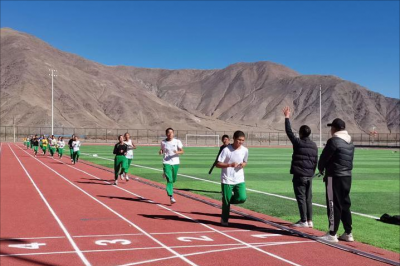Sept. 20, 2016 -- Seed germinators and western medical equipment are no longer novelties in Tibetan medicine hospitals, as researchers and doctors become increasingly technologically adept.
Tashi Tsering with the Biological Research Institute of Tibetan Medicine (BRITM) at Lhasa's Men-Tsee-Khang -- a traditional Tibetan hospital founded in 1916 -- has been growing meconopsis aculeata under controlled conditions for six years.
A rare member of the poppy family, the flowering plant grows only at high altitude and is used in 257 traditional remedies, principally for liver complaints.
As global warming pushes the snowline upward, the plant's habitat has shifted from 3,000-4,000 meters above sea level to 5,000. This, coupled with growing demand, has resulted in even greater scarcity, according to Tashi Tsering.
GROWING INFLUENCE
Tashi Tsering and his team surveyed 37 counties in Gansu, Qinghai, Sichuan, Tibet and Yunnan before their first attempt to cultivate the plant.
"We scored zero on our first try," he said. No seeds sprouted in 2011 at the test site in Lhasa, despite the light, temperature, moisture and soil having been meticulously controlled to simulate the natural habitat.
The planting season comes but once a year, and in the second year, the germination rate rose to 17 percent. In 2015, the team harvested their own seeds for the first time and this year almost 90 percent of them sprouted. Despite the achievement, it is too early to begin celebrations until technical assessment and lab tests confirm the reliability of the home-grown product.
Traditionally, Tibetan medical practitioners spent years learning to gather herbs, with instructions so sophisticated that they had to memorize which part of each herb to pick under which weather and seasonal conditions and at which time.
The BRITM has grown 27 endangered herbs in artificial conditions over the past decade and a new lab now houses a variety of equipment including germinators, climate incubators, soil testers and imaging systems.
"To meet the rising demand for Tibetan medicine, artificial cultivation of medicinal herbs is a must," said Tashi Tsering. |
- Home
- News Tibet |Exclusive |China |World |Related News |Latest
- Documents White Papers |Others
- Photo Politics |Economy & Society |Culture & Religion |Human & Nature |Beautiful Tibet |Other Tibetan-Inhabited Area |Exchanges |Related
- Video News |Documentary |Micro-Video |Entertainment
- Art
- Tourism
- In Focus
- About Tibet






